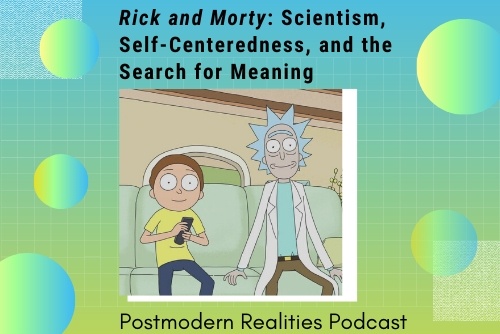In America, nothing seems to validate pop culture success and permeation more than a Super Bowl commercial. When the animated television program Rick and Morty accomplished this feat in February 2020 in a commercial for Pringles chips, it reached more than 100 million viewers. Currently, in its fourth season, Rick and Morty first aired on the Cartoon Network in 2013, and in 2019 it was renewed for 70 more episodes guaranteeing it will be on TV for years to come. It’s a fast-paced series that packs a lot of content into an average air time of 22 minutes. Although animation is often pigeonholed as entertainment for kids, Rick and Morty is decidedly adult-oriented with its R rated language and many profane bits sprinkled throughout the show. Featured on Cartoon Network’s [Adult Swim] programming block, Rick and Morty garners its most viewers in the 18-34-year-old range. Given its popularity and its nihilistic world view, Christian apologists need to understand the show, its appeal, and how to reach Millennials who are its devoted fans.
This Postmodern Realities episode is a conversation with Journal author Robert Velarde about his online-exclusive article, “Rick and Morty: Scientism, Self-Centeredness, and the Search for Meaning“.
We’d also like to invite you to subscribe to the Journal. To subscribe to the Journal, please click here.
When you to subscribe to the Journal, you join the team of print subscribers whose paid subscriptions help provide the resources at equip.org that minister to people worldwide. These resources include our free online-exclusive articles, such as this review, as well as our free Postmodern Realities podcast.
Another way you can support keeping our resources free is by leaving us a tip. A tip is just a small amount, like $3 or $5, which is the cost for some of a latte, lunch out, or coffee drink. To leave a tip, click here.
Other articles and Postmodern Realities podcasts related to this topic:
Episode 148-In Defense of Pop Culture
Ditching Netflix? Engaging Pop Culture in the Age of Binge-Watching
Episode 149 What Joker Gets Right About Human Depravity
Episode 037: Choose Your Own Enchantment: Freedom and Conscience in What We Watch
Choose Your Own Enchantment: Freedom and Conscience in What We Watch
Episode 075: Film Nostalgia & Heaven
Looking for Heaven at the Movies: What our Fondness for Nostalgic Films Says about Us.”
Television as the New Literature: Understanding and Evaluating the Medium
Prometheus: Finding God in Outer Space
Unpacking Anime’s Thematic and Spiritual Depth
The Artistic Pro-Life Theme in Netflix’s I Am Mother
Postmodern Realities Episode 132: The Artistic Pro-Life Theme in Netflix’s I Am Mother
“HBO’s Westworld and the Ethics of Artificial Intelligence.”
Breaking Bad’s Addicting Defense of Moral Realism
Episode 039: The Gospel According to Marvel
The Gospel According to Marvel
Episode 024: Dr. Strange (film review with spoilers)
Fighting Scientism with the Occult in Doctor Strange
Episode 017: Suicide Squad, Deadpool, and the Rise of the Comic Book Antihero
Suicide Squad, Deadpool, and the Rise of the Comic Book Antihero
Episode 139 Clear Skies, Hurt Hearts, Can’t Lose: Why Spielberg’s Aliens Help Make us More Human
Clear Skies, Hurt Hearts, Can’t Lose: Why Spielberg’s Aliens Help Make us More Human
Episode 123 Tolkien’s First Fellowship
Tolkien’s First Fellowship A film review of Tolkien
Episode 100: A. Hitchcock Films
“Caught Looking: Hitchcock’s Films in the Age of Instagram.”
Episode 001: The Films of Quentin Tarantino
Episode 067: Spielberg’s Nostalgia for Reality in Ready Player One
Spielberg’s Nostalgia for Reality in Ready Player One.”
Episode 054: The Last Jedi: A Star Wars Movie for the Era of “the Nones”
The Last Jedi: A Star Wars Movie for the Era of “the Nones”
Episode 027: “Evaluating the Star Wars Worldview”
May the Force Bewitch You: Evaluating the Star Wars Worldview
Episode 041: The Gracious Heroism of Wonder Woman
The Gracious Heroism of Wonder Woman
Jesus Films: Who Does Hollywood Say That I Am?
Episode 079: Theology of Morgan Freeman
“The Story of Morgan Freeman (Not God).”
The Matrix: Unloaded Revelations
A Wrinkle in Time: Drawing Apologetic Value from a De-Christianized Film
